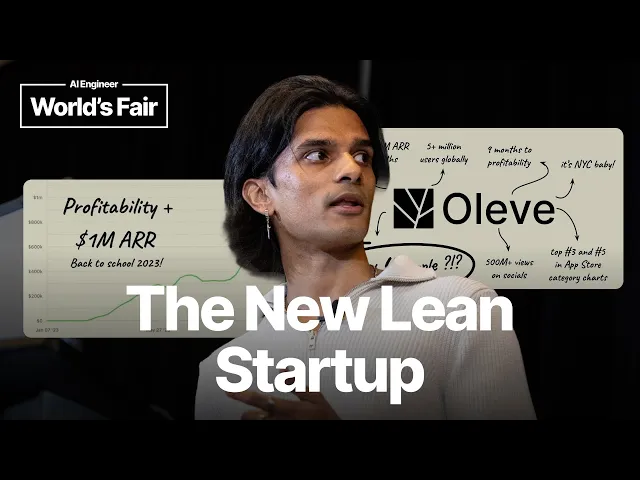The New Lean Startup

The new lean startup for today's founders
In an era where startups fail with alarming regularity, Sid Bendre's recent talk on "The New Lean Startup" offers a refreshing update to Eric Ries' decade-old methodology. Bendre, co-founder of Oleve, presents a modernized framework that acknowledges how dramatically the startup landscape has evolved since 2011, particularly with the advent of powerful AI tools and changing investor expectations.
Key Points
-
Evolution beyond MVP: Bendre shifts focus from building minimal viable products to developing minimal lovable products that users genuinely want to engage with, arguing that in today's saturated market, simply viable isn't enough.
-
The 3P Framework: His approach centers on three pillars—Pain (identifying genuine user problems), Product (creating solutions users love), and Profit (establishing sustainable business models)—while emphasizing that success requires excellence in all three domains.
-
AI as a force multiplier: Rather than fearing AI displacement, Bendre positions AI tools as enablers that allow small teams to accomplish what previously required significant resources, essentially democratizing product development.
-
Continuous iteration loops: The modern lean methodology embraces constant experimentation through tight feedback cycles, allowing founders to navigate uncertainty by making small, frequent adjustments rather than betting on major pivots.
The most compelling insight from Bendre's talk is his emphasis on what he calls "founder-market fit"—the idea that successful startups emerge when founders deeply understand their market through firsthand experience or genuine connection to the problem they're solving. This concept transcends the traditional focus on product-market fit by recognizing that the founders themselves are a critical variable in the startup equation.
This matters tremendously in today's environment where investors have grown increasingly skeptical of founders who opportunistically chase trends without authentic understanding. We've witnessed countless AI startups flounder despite abundant funding because their founders lacked genuine domain expertise. The strongest companies emerge when founders possess what Bendre calls "earned insights"—unique perspectives gained through direct experience that competitors can't easily replicate.
What Bendre doesn't fully explore is how this approach scales across different industry verticals. For example, healthcare startups face regulatory hurdles that make rapid iteration challenging, while enterprise software companies must navigate complex sales cycles that extend feedback
Recent Videos
How To Earn MONEY With Images (No Bullsh*t)
Smart earnings from your image collection In today's digital economy, passive income streams have become increasingly accessible to creators with various skill sets. A recent YouTube video cuts through the hype to explore legitimate ways photographers, designers, and even casual smartphone users can monetize their image collections. The strategies outlined don't rely on unrealistic promises or complicated schemes—instead, they focus on established marketplaces with proven revenue potential for image creators. Key Points Stock photography platforms like Shutterstock, Adobe Stock, and Getty Images remain viable income sources when you understand their specific requirements and optimize your submissions accordingly. Specialized marketplaces focusing...
Oct 3, 2025New SHAPE SHIFTING AI Robot Is Freaking People Out
Liquid robots will change everything In the quiet labs of Carnegie Mellon University, scientists have created something that feels plucked from science fiction—a magnetic slime robot that can transform between liquid and solid states, slipping through tight spaces before reassembling on the other side. This technology, showcased in a recent YouTube video, represents a significant leap beyond traditional robotics into a realm where machines mimic not just animal movements, but their fundamental physical properties. While the internet might be buzzing with dystopian concerns about "shape-shifting terminators," the reality offers far more promising applications that could revolutionize medicine, rescue operations, and...
Oct 3, 2025How To Do Homeless AI Tiktok Trend (Tiktok Homeless AI Tutorial)
AI homeless trend raises ethical concerns In an era where social media trends evolve faster than we can comprehend them, TikTok's "homeless AI" trend has sparked both creative engagement and serious ethical questions. The trend, which involves using AI to transform ordinary photos into images depicting homelessness, has rapidly gained traction across the platform, with creators eagerly jumping on board to showcase their digital transformations. While the technical process is relatively straightforward, the implications of digitally "becoming homeless" for entertainment deserve careful consideration. The video tutorial provides a step-by-step guide on creating these AI-generated images, explaining how users can transform...
